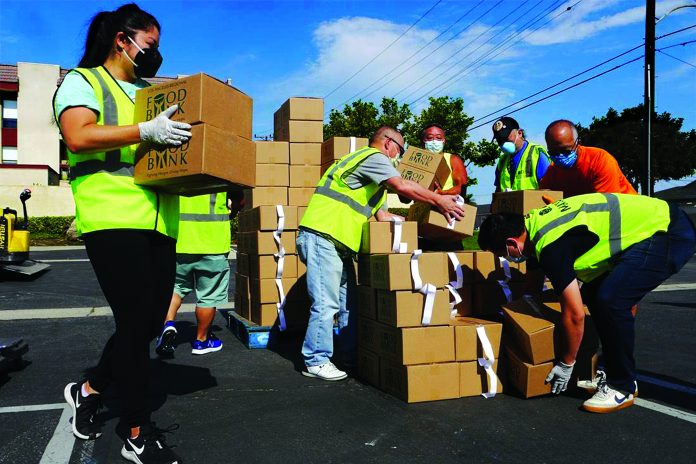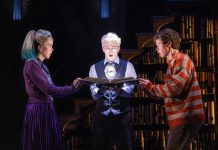
By Gary Kohatsu
It has existed for 108 years, survived two world wars and the depression of the 1930s, seen 19 U.S. presidents in office and 24 summer Olympic Games, the birth of rock and roll and Japanese-made automobiles proliferate in America, as well as home computing, the smart phone and the internet.
Then in 2020, something different affected the Gardena Valley Japanese Cultural Institute in the form of a novel coronavirus.
On March 13, 2020, President Donald Trump declared a national emergency due to COVID-19 that was ravaging the country, as well as the world. Social distancing became the “new normal.”
And on that day in March, the century-plus old GVJCI did something unthinkable in any other circumstance — it closed its doors to the public and its loyal members, including the soul of its existence: senior citizens.
But this is not to say the JCI ceased operation. Quite the contrary, JCI leaders say.
“March 13 meant making quick critical decisions and adjustments in order to keep all of our members, community partners, volunteers, and staff safe and well,” executive director Alison Kochiyama said last week in an email exchange with the GVN.
Despite the temporary facility closure, the JCI staff has continued to work “just as hard if not harder,” adapting to changes, keeping up on the pandemic developments, and being creative on how to continue providing services and support to the community, she said.
The JCI has shifted its operation to a virtual work platform, and are conducting staff, board and community meetings online, she added. Other social media have also been utilized during the pandemic.
Continuing to serve hundreds of elderly citizens has made this age group a high priority for Kochiyama and staff.
“Since many (seniors) come to GVJCI daily for their fitness, recreation, and nutrition programs, we started a Tomo No Kai (senior friendship club) Senior Check-in, a phone-calling program with 17 volunteers calling over 500 TNK members to see how they were doing and if they were in need of any assistance, or if they just wanted a phone buddy during GVJCI’s closure,” Kochiyama said.
In August, the GVJCI will conduct TNK senior classes online, and assist students in this process, she noted. The hope is to encourage seniors to access the same classes they previously attended at the JCI.
The center’s popular senior bento (lunch box) has also seen alterations, partnering now with Healthy Food For Kids through its delivery program. People can also pick up meals at two local restaurants.
“Our staff and volunteers conducted monthly drive-thru pick up of donated food boxes for seniors from LA Food Bank to 130 cars, as well as boxes delivered to the JCI Gardens Senior Apartments next door by Little Tokyo Service Center’s staff and volunteers,” Kochiyama said.
Since the pandemic lockdown, communication with JCI supporters, partners and others has meant mixing old and current technology.
“We knew that many of our senior members are not online, so our phone-calling program was essential, and we even mailed them updates through a postcard mailing,” she said.
Traditionally, the GVJCI prints newsletters that are mailed to 5,000 people. But with the lockout and numerous changes, the Spring 2020 newsletter was delayed — and reintroduced as an online-only publication that will be sent to the center’s 2,500 subscribers. Kochiyama said there are now 3,300 e-subscribers and the list is growing.
In the last few months, JCI Facebook friends have jumped from 1,590 to nearly 1,800 and its Instagram followers have increased from 700 to 1,031.
“Our summer newsletter will be coming out in a couple of weeks that announces our upcoming quarters’ programs,” she said. “Our newsletter calendar spread is filled with online workshops, classes, and fundraising events from August to October. We also have many more workshops that will be conducted in Japanese language. We’ll continue keeping in touch with all of our members and supporters through our printed and online newsletter, and our eblasts and social media.”
As with most organizations, fundraising is a key part of its year-round duties to stay operational. The GVJCI Matsuri (carnival) is the institute’s major annual fundraiser and is a two-day event held the last weekend of June at the GVJCI facility.
Kochiyama and her support team had to be creative in reinventing the “live” experience of carnival activity.
The solution to the recent June 27-28 event was to repackage the Matusuri to a virtual, weeklong experience, she said.
“It was our first ever virtual event, and our staff, social media intern, volunteers, and community partners worked together to produce a weeklong Virtual Matsuri filled with fun videos of festival foods, games, dance, and other entertainment — much of what we all missed from the physical Matsuri community event,” she said. “We were so touched by the outpour of support we got from the community through donations and encouragement and we were thankful for our sponsors, who continued to support this event.
“Our fundraising efforts did very well considering, and I think the Virtual Matsuri was able to bring back some joy and nostalgic memories of our Matsuri,” she added.
She said the support of business partners remain vital to the JCI’s existence.
“We’ll continue with our fundraising efforts, since it’s become even more crucial now,” Kochiyama said. “Our expenses have always come under budget, however, the income we used to depend on for facility fees and daily program fees have ceased. We thank our donors who have supported us through these difficult times, which also includes many of our member organizations that hold weekly activities here.”
The JCI’s Japanese Language School reverted to online teaching this spring and recently saw students complete their semester in style.
“(The school featured) a special graduation ceremony for our five graduates with their families online,” Kochiyama said. “We will continue our Japanese Language School online in the fall with registration in August, and classes beginning Sept. 12.”
Every year, the GVJCI rewards a handful of graduating high school seniors with scholarship money. This year was no different.
“Although we could not hold the traditional scholarship awards presentation at the onsite Matsuri this year, we were able to feature their speeches as part of the Virtual Matsuri,” Kochiyama said.
Ray Shibata, a GVJCI board member and part of the scholarship committee, praised this year’s scholarship students.
“Each year we are impressed and inspired by the youth who apply to our scholarship programs, their scholastic achievements, their future goals, their commitment and involvement with the community, and with the JCI as volunteers,” Shibata said in a video presentation.
The 2020 Scholar winners are:
- MELANIE ODA — a Torrance High graduate who will attend UC San Diego in the fall and will major in chemical engineering. Winner of the Gary Horii Scholarship.
- CARINA SAKIMURA — a Palos Verdes Peninsula grad planning to attend USC in the fall. She will study psychology. GV JACL Scholar.
- ALEXANDER ITO — a West High in Torrance grad. He will attend El Camino College in the fall, then move on to UCLA to earn a degree in psychology. GV JACL Scholar.
- KRISTIN AKIOKA — a North High grad in Torrance. She plans to enroll at El Camino College in the fall for her general education classes, then move on to a 4-year university for a kinesiology degree. Gardena Valley Gardeners Legacy Scholar.
- JENNIFER SHIMIZU — a North High grad, who will attend UC Santa Barbara and major in pharmacology. GVJCI Scholar.
During the lockdown, JCI staff is busy performing tasks at home or at the JCI facility. They are also addressing work that would be challenging to complete when the doors are open to the public.
“All of our staff members have continued to work from home majority of the time and going into the office as needed,” Kochiyama said. “Our facility staff members have been going into GVJCI maintaining the buildings and taking care of deep cleaning projects that were more difficult to carry out when our buildings were occupied day and night, seven days a week.”
Staff workers are also answering phone calls and emails during the week, but “not taking in-person visitors.”
Any thoughts of reopening the GVJCI remain on the discussion table, Kochiyama said. JCI officials are following LA County and city of Gardena reopening guidelines closely. Kochiyama and staff are making preparations accordingly; having developed a GVJCI Reopening Strategy in accordance with the CDC and Los Angeles Department of Public Health requirements.
“As small group activities are permitted, we will be reopening our facility in a limited capacity,” she said. “However, the majority of our activities will remain online throughout the pandemic.”
The GVJCI serves the community as a gathering place. How to facilitate recurring and annual events are topics of discussion for Kochiyama and the JCI board members.
“We’ll be discussing our annual Day of Remembrance to be held in February, which usually draws 300 people in our hall,” she said. But we plan to continue events like this, although they may take a different form.”
Despite the hardships of the pandemic, Kochiyama said the JCI has the resources to create a new normal in 2020 and beyond.
“Several months after the closure, we’ve learned new ways to communicate with our members,” she said. “Now is the time to really think ‘out of the box’ and we have to be very creative and innovative. We’ve been fortunate to have tech-savvy staff, interns, volunteers, and even board members who have been able to help us brainstorm creative solutions and new methods.”
For more information about the GVJCI and its services:
www.jci-gardena.org
Facebook: http://www.facebook.com/GVJCI
To experience the 2020 Virtual Matsuri:
https://www.jci-gardena.org/gvjci-virtual-matsuri.html
The 2020 Student Scholarship Recipients:
https://www.jci-gardena.org/gvjci-scholarship.html
To contact the Gardena Valley Cultural Institute, call phone 310-324-6611.


















